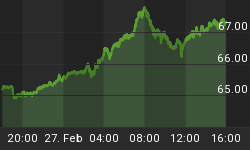"Watch out for emergencies. They are your big chance." ~ Fritz Reiner
While everyone is focusing on the so called obvious factors, they have missed the most important factor; the real reason behind the crisis. The crisis started in Greece and the top EU members knew they were going to bail out Greece and potentially any other member that needed help, but they pretended that they would not. One of the obvious reasons for the bailout was not to protect Greece, but to save the bond holders; most of the bond holders are foreigners. That's the same reason the banks were bailed out in the US, to protect the large shareholders; it's all a game of smoke and mirrors.
Our hypothesis is that the main reason that the Euro crisis was allowed to evolve was to deflate the Euro. Note that we have stated many times in the past that we have now entered into the competitive currency devaluation era, where the theme is or will soon be "devalue or die". Or maybe we should add "devalue or die trying to", for nations are going to do whatever it takes to keep their products competitive in the global market. We recently spoke of this phenomenon in two separate articles Currency-devaluation-a-race-to-the-bottom and the devalue or die era is picking up steam.
Germany was knocked out of the top place and replaced by China as the world's largest exporter and that must have hurt. Thus by allowing the crisis to progress, the EU could, in fact, devalue the Euro without actually issuing new currency. And then when things started to look really bad, they could pretend to help by approving a huge package, but this package would now devalue the euro even more. Thus with one stone they killed two birds in the sense that it produced double the effect. If they had approved a bailout package immediately, the euro would not have shed as much as it did. In a matter of months the Euro dropped almost 24%; in the currency markets, this is considered to be a very large move.
Another factor to consider is that no government wants to pay its debt in a stronger currency; governments borrow money so that they can pay it back with cheap currency.
Thus while one currency might appear to be appreciating against another; the truth is that they are all falling down, some faster than others. Take a look at some long term commodity charts, and you will notice that most of them are in up trends, regardless of which currency they are priced. For example, a 3 year chart of gold priced in any currency shows that it's in an uptrend. The race to the bottom has picked up in intensity. We would not be surprised now if some sort of crisis hits Asia; this would complete the circle perfectly. A position in precious metals is recommended. View this as a hedge/insurance against another potential crisis; if you have no position wait for strong pull backs before deploying new money.
"Crises refine life. In them you discover what you are." ~ Allan K. Chalmers















